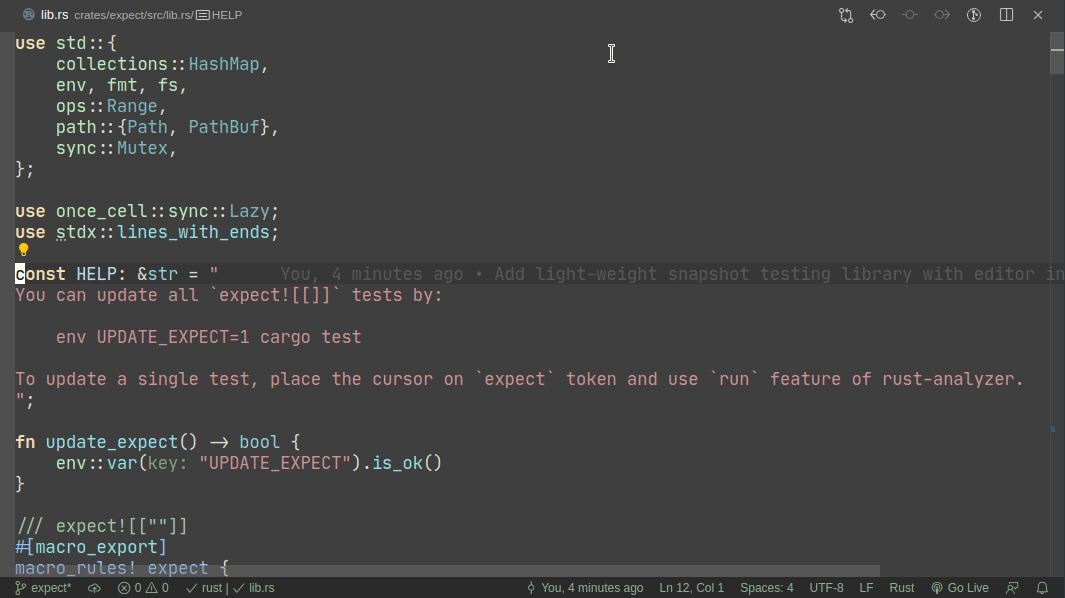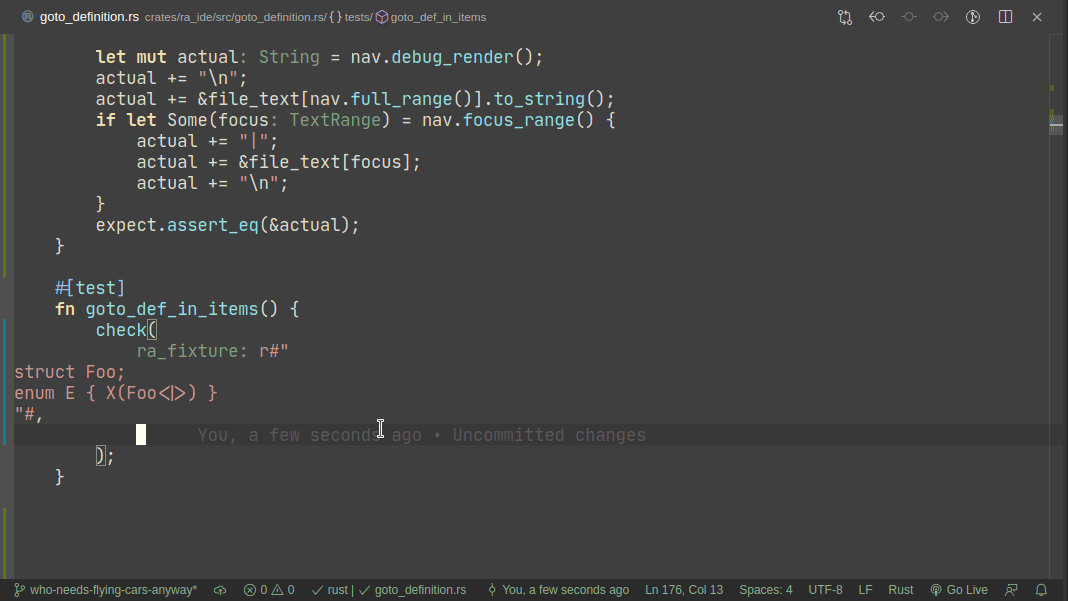5101: Add expect -- a light-weight alternative to insta r=matklad a=matklad
This PR implements a small snapshot-testing library. Snapshot updating is done by setting an env var, or by using editor feature (which runs a test with env-var set).
Here's workflow for updating a failing test:

Here's workflow for adding a new test:

Note that colorized diffs are not implemented in this PR, but should be easy to add (we already use them in test_utils).
Main differences from insta (which is essential for rust-analyzer development, thanks @mitsuhiko!):
* self-updating tests, no need for a separate tool
* fewer features (only inline snapshots, no redactions)
* fewer deps (no yaml, no persistence)
* tighter integration with editor
* first-class snapshot object, which can be used to write test functions (as opposed to testing macros)
* trivial to tweak for rust-analyzer needs, by virtue of being a workspace member.
I think eventually we should converge to a single snapshot testing library, but I am not sure that `expect` is exactly right, so I suggest rolling with both insta and expect for some time (if folks agree that expect might be better in the first place!).
# Editor Integration Implementation
The thing I am most excited about is the ability to update a specific snapshot from the editor. I want this to be available to other snapshot-testing libraries (cc @mitsuhiko, @aaronabramov), so I want to document how this works.
The ideal UI here would be a code action (💡). Unfortunately, it seems like it is impossible to implement without some kind of persistence (if you save test failures into some kind of a database, like insta does, than you can read the database from the editor plugin). Note that it is possible to highlight error by outputing error message in rustc's format. Unfortunately, one can't use the same trick to implement a quick fix.
For this reason, expect makes use of another rust-analyzer feature -- ability to run a single test at the cursor position. This does need some expect-specific code in rust-analyzer unfortunately. Specifically, if rust-analyzer notices that the cursor is on `expect!` macro, it adds a special flag to runnable's JSON. However, given #5017 it is possible to approximate this well-enough without rust-analyzer integration. Specifically, an extension can register a special runner which checks (using regexes) if rust-anlyzer runnable covers text with specific macro invocation and do special magic in that case.
closes#3835
Co-authored-by: Aleksey Kladov <aleksey.kladov@gmail.com>
5119: Show notification while SSR is in progress r=matklad a=davidlattimore
Ideally we would (a) show progress and (b) allow cancellation, but at least now there's some indication to the user that something is happening.
Co-authored-by: David Lattimore <dml@google.com>
5025: Don't mess with messy temp dir and just download into extension dir r=matklad a=Veetaha
Temp dirs are messy. Dealing with them requires handling quite a bunch of
edge cases. As proposed by lnicola this seems better to just put the temp files
in the extension dir and not care much about suddenly leaving garbage.
Instead we get shorter and less platform-caveat-y code.
We will also assume users don't try to issue a download in different vscode windows simultaneously.
Fixes#5019
Co-authored-by: Veetaha <veetaha2@gmail.com>
Temp dirs are messy. Dealing with them requires handling quite a bunch of
edge cases. As proposed by lnicola this seems better to just put the temp files
in the extension dir and not care much about suddenly leaving garbage.
Instead we get shorter and less platform-caveat-y code.
We will also assume users don't try to issue a download in different vscode windows simultaneously
4992: Never disable error logging on the frontend r=matklad a=Veetaha
4993: Make bootstrap error message more informative and better-fitting r=matklad a=Veetaha
Now this better fits standard vscode extension activation failure message and suggests enabling verbose logs.

4994: Decouple http file stream logic from temp dir logic r=matklad a=Veetaha
Followup for #4989
4997: Update manual.adoc r=matklad a=gwutz
GNOME Builder (Nightly) supports now rust-analyzer
4998: Disrecommend trace.server: "verbose" for regular users r=matklad a=Veetaha
This option has never been useful for me, I wonder if anyone finds regular users can use this for sending logs
Co-authored-by: Veetaha <veetaha2@gmail.com>
Co-authored-by: Günther Wagner <info@gunibert.de>
4580: Fix invoking cargo without consulting CARGO env var or standard installation paths r=matklad a=Veetaha
Followup for #4329
The pr essentially fixes [this bug](https://youtu.be/EzQ7YIIo1rY?t=2189)
cc @lefticus
Co-authored-by: veetaha <veetaha2@gmail.com>
This is useful when an extension (e.g. Nix Environment Selector) or launch
configuration sets one or more environment variables.
When `env` is not explicitly specified in the options passed to
`child_process.spawn()` or `vscode.ShellExecution()`, then `process.env` gets
applied automatically. But when an explicit `env` is set, it should inherit from
`process.env` rather than replace it completely.